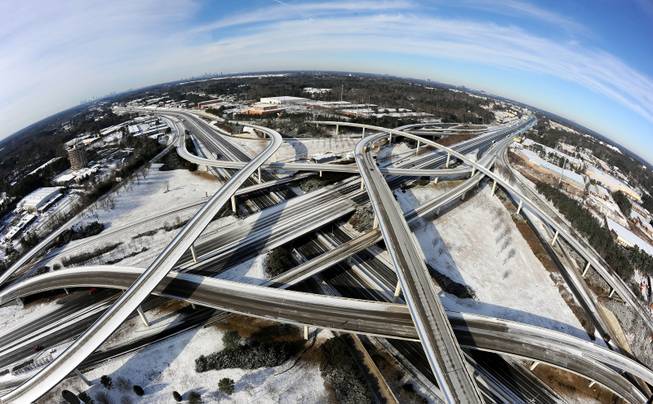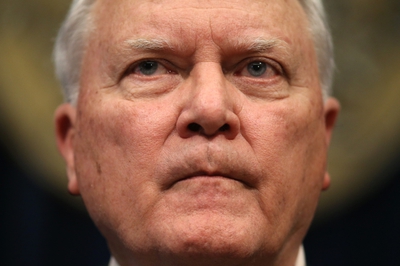
AP
In this photo taken with a fisheye lens over the city’s perimeter highway known as “Spaghetti Junction,” the ice-covered interstate system shows the remnants of a winter snow storm that slammed the city with over 2 inches of snow that turned highways into parking lots when motorists abandoned their vehicles creating massive traffic jams lasting through, Wednesday, Jan. 29, 2014, in Atlanta.
Monday, Feb. 10, 2014 | 8:36 p.m.

Gov. Nathan Deal listens to a question about the state's response to the snow storm during a news conference Wednesday, Jan. 29, 2014, in Atlanta. A rare snowstorm left thousands across the U.S. South frozen in their tracks, with workers sleeping in their offices, students camping in their schools, and commuters abandoning cars along the highway to seek shelter in churches or even grocery stores.
ATLANTA — Just two weeks ago, Atlanta became a national punch line when a few inches of snow crippled the city. Comedians said the gridlocked highways looked more like a zombie apocalypse than the South's bustling business hub.
On Monday, officials were quick to act as the winter weather zeroed in, determined not be the butt of jokes like the Saturday Night Live parody that referred to the "devil's dandruff" and "Yankee's slush." Before a single drop of freezing rain or snow fell, Georgia Gov. Nathan Deal had declared a state of emergency for nearly a third of the state, schools canceled classes and workers were staying home.
Still, people were skeptical the state would be better prepared this time.
"I'm not counting on it. I've been in Georgia on and off for 20 years. It's usually the same scenario, not enough preparations and not enough equipment," said Terri Herod, who bought a large bag of sand and a shovel at a Home Depot. She said her sister told her to also buy kitty litter in case her car gets stuck on an ice patch.
The memories of the last storm were too fresh for some. Late last month, students were trapped on buses or at schools and thousands of cars were abandoned along highways as short commutes turned into odysseys. One woman gave birth on a jammed interstate. In the chaos, though, there were stories of Southern hospitality — people opening up homes and businesses to help the stranded. Officials reported one accident-related death.
This storm could be worse this time. A one-two punch of winter weather was expected for Atlanta and northern Georgia. Rain and snow were forecast Tuesday, followed by sleet and freezing rain Wednesday. Downed power lines and icy roads were a major worry. Salt trucks, snow plows were ready to roll and the National Guard has 1,400 four-wheeled drive vehicles to help anyone stranded.
Other parts of the South were expected to get hit as well. Alabama, which saw stranded vehicles and had 10,000 students spend the night in schools during the January storm, was likely to get a wintry mix of precipitation. Parts of Mississippi could see 3 inches of snow, and a blast of snow over a wide section of Kentucky slickened roads and closed several school districts. South Carolina, which hasn't seen a major ice storm in nearly a decade, could get a quarter to three-quarters of an inch of ice.
Atlanta has a long and painful history of being ill-equipped to deal with snowy weather and people were not taking any chances, even though officials promised the response would be different this time.
"We're not looking back, we're looking forward," Deal said. "The next three days are going to be challenging. We want to make sure we are as prepared as possible."
Schools announced early that they would close Tuesday, and tractor-trailer drivers were handed fliers about the weather and a law requiring chains on tires. City and state government were to stay open Tuesday, but the governor called for a liberal-leave policy, meaning if workers didn't want to come in they didn't have to. More than 500 Delta flights with Atlanta connections on Tuesday had been canceled, and passengers traveling through several Southeastern states between Tuesday and Thursday were offered a chance to make free one-time changes to their itineraries.
People around Atlanta planned to stay off the roads, which couldn't be treated last time because there were too many cars stuck on them.
"Basically, everyone from the office is going to be working from home" on Tuesday, Dakota Herrera said as he left a downtown car park on his way to the office Monday.
Deal was doing many things differently. He opened an emergency operations center and held two news conferences before the storm. When the Jan. 28 storm hit, Deal was at an awards luncheon with Mayor Kasim Reed, who was named a magazine's 2014 "Georgian of the Year."
Reed had just tweeted: "Atlanta, we are ready for the snow."
This time, the mayor made no such predictions. Instead, he said he was in contact with school leaders and the city had 120 pieces of equipment to spread salt and sand and plow snow.
"We are just going to get out here and, flat out, let our work speak for itself," Reed said.
During the last storm, Deal and Reed didn't hold their first news conference until hours after highways were jammed.
Much is at stake for the governor, a Republican who is up for re-election, and Reed, who is seen as a rising star in the Democratic Party and has aspirations for higher office. Both took heat from residents, forecasters and even comedians during the last storm.
Saturday Night Live spoofed a storm "survivor" with a thick Southern accent. "The sun will rise again," the character said at one point. Jon Stewart quipped: "The ice age zombie doomsday apocalypse has come to Atlanta."
The governor apologized and announced the formation of a task force to study the problems. He also called for various reviews and wants a new public alert system for severe weather, similar to what's used for missing and endangered children.
Aaron Strickland, emergency operations director for Georgia Power, said the utility was bringing in crews from Florida, Texas, Oklahoma and Michigan.
"Ice is probably one of the worst events we face," Strickland said. "When you look at the types of ice we are talking about, it's catastrophic."

Join the Discussion:
Check this out for a full explanation of our conversion to the LiveFyre commenting system and instructions on how to sign up for an account.
Full comments policy